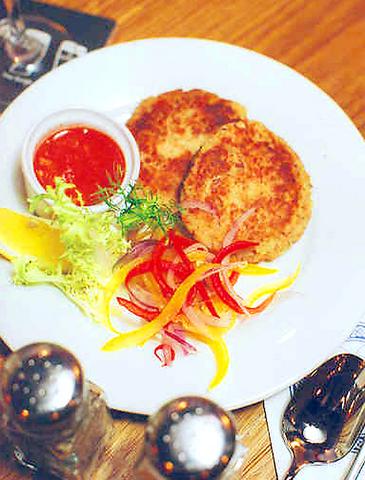Among the foreign community in Taipei, word of mouth has given The Shannon, which had its soft opening last Friday, about the best kind of publicity an establishment could desire. Located next door to the long-established Dan Ryan's and entering into direct competition with Taipei's only other "authentic" Irish establishment, Sean's at the Westin Hotel, it was hardly surprising that The Shannon was packing them in minutes after it opened its doors for the first time.
At the end of its first night, as many as 600 people were estimated to have passed through the restaurant's doors. Despite the crowds, there were some adverse comments, ranging from watery Guinness to clueless staff and tacky furnishings. But plenty of others where willing to give it another chance.
"We are not TGI Friday's nor any kind of chain like that, said Alan Duffy, the lead consultant for the Irish-themed establishment. "We don't have the ability to do a month's training behind closed doors." He put his trust in the enthusiasm of the staff and the occasional complementary drink until things settle down. "We are still pretty much a baby," he added.

PHOTO COURTESY OF THE SHANNON
The draft Guinness, a big draw for many, comes a bit rich at NT$230 plus 10 percent service charge for the pint, but Duffy shrugged this off, saying that even at this price he's close to losing money on the stuff but Guinness and Kilkenny (NT$220 per pint), the establishment's other Irish draft, are an integral part of The Shannon's concept. "And we are not forcing the stuff down anyone's throat," he added. The Carlsburg draft (NT$170) and the good range of bottled beers (NT$150) are sold pretty much at market rates.
The Shannon has a large menu which spans pub classics such as beef and Guinness pie, to elegantly presented starters such as smoked salmon on thinly sliced toast. The emphasis on hearty meals -- door-stop sandwiches (NT$300 and up) and the like -- is rather reminiscent of its Chicago-themed neighbor. Dishes such as the Limerick Caesar are a great endorsement of US-Irish relations and one really doesn't know what to think about Irish lasagna. Certainly, the Irish stew that was served to the ladies and gents of the press at yesterday's press lunch fitted the hearty meals bill, with big chunks and potato and carrot, and there was no stinting on the lamb, even if it was a touch bland.
But for the moment, Duffy sees The Shannon primarily as a "meeting place," where people will come for a few drinks before moving on. Its four separate seating areas, one themed for the Celtic revival, one for the traditional Irish shop and yet another a more ornate Victorian-style lounge, in addition to the bar itself, gives drinkers and diners a selection of spaces in which to get comfortable. The restaurant will officially launch on Sept. 12 but is already open for business.

Words of the Year are not just interesting, they are telling. They are language and attitude barometers that measure what a country sees as important. The trending vocabulary around AI last year reveals a stark divergence in what each society notices and responds to the technological shift. For the Anglosphere it’s fatigue. For China it’s ambition. For Taiwan, it’s pragmatic vigilance. In Taiwan’s annual “representative character” vote, “recall” (罷) took the top spot with over 15,000 votes, followed closely by “scam” (詐). While “recall” speaks to the island’s partisan deadlock — a year defined by legislative recall campaigns and a public exhausted

The primaries for this year’s nine-in-one local elections in November began early in this election cycle, starting last autumn. The local press has been full of tales of intrigue, betrayal, infighting and drama going back to the summer of 2024. This is not widely covered in the English-language press, and the nine-in-one elections are not well understood. The nine-in-one elections refer to the nine levels of local governments that go to the ballot, from the neighborhood and village borough chief level on up to the city mayor and county commissioner level. The main focus is on the 22 special municipality

Hsu Pu-liao (許不了) never lived to see the premiere of his most successful film, The Clown and the Swan (小丑與天鵝, 1985). The movie, which starred Hsu, the “Taiwanese Charlie Chaplin,” outgrossed Jackie Chan’s Heart of Dragon (龍的心), earning NT$9.2 million at the local box office. Forty years after its premiere, the film has become the Taiwan Film and Audiovisual Institute’s (TFAI) 100th restoration. “It is the only one of Hsu’s films whose original negative survived,” says director Kevin Chu (朱延平), one of Taiwan’s most commercially successful

In the 2010s, the Communist Party of China (CCP) began cracking down on Christian churches. Media reports said at the time that various versions of Protestant Christianity were likely the fastest growing religions in the People’s Republic of China (PRC). The crackdown was part of a campaign that in turn was part of a larger movement to bring religion under party control. For the Protestant churches, “the government’s aim has been to force all churches into the state-controlled organization,” according to a 2023 article in Christianity Today. That piece was centered on Wang Yi (王怡), the fiery, charismatic pastor of the